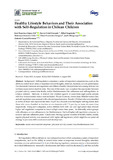Mostrar el registro sencillo del ítem
Healthy lifestyle behaviors and their association with self-regulation in Chilean children
| dc.creator | López Gil, José Francisco | es_ES |
| dc.creator | Oriol Granado, Xabier | es_ES |
| dc.creator | Izquierdo Redín, Mikel | es_ES |
| dc.creator | Ramírez Vélez, Robinson | es_ES |
| dc.creator | Fernández Vergara, Omar | es_ES |
| dc.date.accessioned | 2021-01-20T09:41:11Z | |
| dc.date.available | 2021-01-20T09:41:11Z | |
| dc.date.issued | 2020 | |
| dc.identifier.issn | 1660-4601 (Electronic) | |
| dc.identifier.uri | https://hdl.handle.net/2454/39023 | |
| dc.description.abstract | Background: Self-regulation comprises a series of important competencies, such as the ability to control inner states or responses toward thoughts, attention, emotions, or even performance. The relationship between self-regulation and different healthy lifestyle behaviors among children has not been examined in depth to date. The aim of this study was to explore the association between physical activity, screen time levels, and/or Mediterranean Diet adherence and self-regulation in Chilean children. Methods: A total of 1561 children aged 8–12 years from eight public schools with low socioeconomic status were included. Physical activity, screen time, Mediterranean Diet, and self-regulation were assessed with validated questionnaires. Results: Children who were classified as active or those who reported less than 2 h per day of screen time had higher self-regulation than those who were classified as inactive or counterparts with 2 h per day or more of screen time, respectively. Using joint categories, active children both with low and high screen time showed higher self-regulation compared to inactive/high screen time peers. Additionally, active groups with adherence or non-adherence to the Mediterranean Diet had higher self-regulation compared to inactive and non-adherence peers. Conclusion: Having a greater number of healthy habits, mainly regular physical activity, was associated with higher self-regulation, which might be one potential strategy to promote child social-emotional development. | en |
| dc.description.sponsorship | This study was funded by the Vicerrectoría de Investigación, Desarrollo e Innovación (Proyectos Basales. Grant number: 051641ZR_DAS) of the Universidad de Santiago de Chile (Chile). A.G.-H. is a Miguel Servet Fellow (Instituto de Salud Carlos III – FSE, CP18/0150). R.R.-V. is funded in part by a Postdoctoral Fellowship Resolution ID 420/2019 of the Universidad Pública de Navarra | en |
| dc.description.sponsorship | This study was funded by the Vicerrectoría de Investigación, Desarrollo e Innovación (Proyectos Basales. Grant number: 051641ZR_DAS) of the Universidad de Santiago de Chile (Chile). | en |
| dc.format.extent | 10 p. | |
| dc.format.mimetype | application/pdf | en |
| dc.language.iso | eng | en |
| dc.publisher | MDPI | en |
| dc.relation.ispartof | International Journal of Environmental Research and Public Health, 2020, 17(16), 5676 | en |
| dc.rights | © 2020 by the authors. Licensee MDPI, Basel, Switzerland. This article is an open access article distributed under the terms and conditions of the Creative Commons Attribution (CC BY) license. | en |
| dc.rights.uri | http://creativecommons.org/licenses/by/4.0/ | |
| dc.subject | Social-emotional development | en |
| dc.subject | Physical activity | en |
| dc.subject | Screen time | en |
| dc.subject | Mediterranean diet | en |
| dc.title | Healthy lifestyle behaviors and their association with self-regulation in Chilean children | en |
| dc.type | info:eu-repo/semantics/article | en |
| dc.type | Artículo / Artikulua | es |
| dc.contributor.department | Ciencias de la Salud | es_ES |
| dc.contributor.department | Osasun Zientziak | eu |
| dc.rights.accessRights | info:eu-repo/semantics/openAccess | en |
| dc.rights.accessRights | Acceso abierto / Sarbide irekia | es |
| dc.identifier.doi | 10.3390/ijerph17165676 | |
| dc.relation.publisherversion | https://doi.org/10.3390/ijerph17165676 | |
| dc.type.version | info:eu-repo/semantics/publishedVersion | en |
| dc.type.version | Versión publicada / Argitaratu den bertsioa | es |



